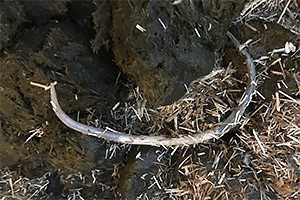Did you know that mild winters affect the infection pressure of worm infestations in horses?
Mild winters and the absence of prolonged frost or cold have led to higher infection pressure during winter. In recent years, more horses are kept on pasture 24/7. If the manure is not removed, the pasture remains infectious for a longer period.
Most larvae and eggs easily survive frost in the top layer of the soil. Infectious larvae of the small strongyle can survive on the pasture for up to three months.
Roundworm
Roundworm eggs, which often already contain a larva, are surrounded by three protective layers and can be ingested year-round. These eggs are well protected against temperature changes and chemical agents and can remain infectious for up to ten years. Because they survive so well outside the horse, any pasture where infected horses have been is considered contaminated. That’s why it’s very important to remove manure.
What can you do?

